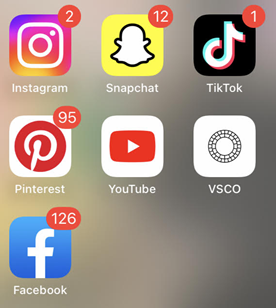Social Media Has Changed the World: But is it for the Better?

Social Media Apps
Social media was introduced in 1997 to allow users to connect with new people worldwide. Over the years, social media has developed into a toxic platform that causes mental health issues in teenagers. Although some believe social media allows users to spread awareness and connect with loved ones from long distances, it is hazardous to mental health in young adults. It introduces them to cyberbullying, insecurities, and unrealistic standards they feel the need to attain.
With 77 percent of Americans having at least one social media app, it proves how easily people can become addicted. 92 percent of teenagers say they use social media daily. Most teenagers are obsessed with their phones, which can quickly become an issue. 60 percent of teenagers say their social media usage has lowered their self-esteem, and 51 percent say it has made them self-conscious about their appearance.
Social media can reach large groups of people in just minutes and spread awareness about important global issues. Many use apps to find support regarding topics that may be difficult to discuss. While social media can be a safe space for teenagers struggling with mental illness, it can also be one of the leading causes. During their teenage years, young adults already deal with a lack of confidence, and while scrolling through Instagram, they often compare themselves to the people on their screens.
It has become an unhealthy obsession to try to fit the beauty standard society set, and they are unaware that most posts have filters or are altered in some way. “It could lead to insecurities because teenagers spend hours a day looking at celebrities that create unrealistic standards.”, says Luke Mastrogiovanni, a senior at Pennridge They may also become depressed due to cyberbullying, which affects over 40 percent of Americans. Megan Reim, a teacher at Pennridge High School, says, “When you put videos out for the public, people begin to attack that and make fun of what the person is doing. Something that does not seem harmful to you can be twisted online.” These cyberbullies attack the victim’s every move, leading to 68 percent of victims that deal with harassment having mental health issues. Victims of bullying are 1.9 times more likely to commit suicide, making it the second leading cause of death in the U.S.
Even though social media users are aware of the negativity, they still find themselves unable to delete the apps. An alternative for deleting social media could be limiting screen time; phones offer users to set a time when their phone will shut down. If this isn’t a possibility, people should consider using their phones for only a couple of hours daily. With social media deteriorating their mental health, it would be beneficial to take a break or lower their time online.
https://www.lewisu.edu/experts/wordpress/index.php/the-pros-and-cons-of-using-social-media/
https://www.addictioncenter.com/drugs/social-media-addiction/
https://theforestscout.com/12429/in-our-opinion/social-media-is-feeding-your-insecurities/
https://www.toplinemd.com/ana-hpmd/social-medis-teenage-insecurities/
Lux Concannon, Grade 12. Interests/hobbies include hanging out with friends and family, doing makeup, traveling, and camping. Lux plans to attend college...









